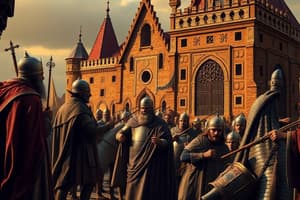Podcast
Questions and Answers
Flashcards are hidden until you start studying
Study Notes
Early Life and Rise to Power
- Born in 741 or 742 CE, likely in Liège, Belgium
- Son of Pepin the Short, King of the Franks
- Became King of the Franks in 768 CE, after his father's death
- Initially ruled with his brother Carloman, but became sole ruler after Carloman's death in 771 CE
Conquests and Empire Building
- Conquered the Lombards in Italy (774 CE) and Saxons in Germany (777-804 CE)
- Defeated the Avars in Central Europe (791-796 CE)
- Established a vast empire, stretching from modern-day France to Italy and Germany
- Crowned as Holy Roman Emperor by Pope Leo III on December 25, 800 CE
Administrative and Cultural Reforms
- Implemented the Carolingian Renaissance, promoting education, art, and literature
- Established a standardized system of weights and measures
- Encouraged the development of a written language, using the Latin alphabet
- Supported the creation of monasteries and scriptoria, which preserved classical texts
Military and Governmental Reforms
- Reorganized the Frankish army, creating a more efficient and centralized military
- Introduced the feudal system, where lords held land in exchange for loyalty and military service
- Established a network of royal officials, known as missi dominici, to govern the empire
Legacy
- Unified much of Western Europe, creating a foundation for modern European politics
- Promoted the spread of Christianity and preserved classical knowledge
- Established the Carolingian dynasty, which ruled the Franks for over a century
- Died on January 28, 814 CE, at the age of 71 or 72, in Aachen, Germany
Early Life and Rise to Power
- Born in 741 or 742 CE, likely in Liège, Belgium, as the son of Pepin the Short, King of the Franks
- Became King of the Franks in 768 CE after his father's death, initially ruling with his brother Carloman
- Became sole ruler after Carloman's death in 771 CE
Conquests and Empire Building
- Conquered the Lombards in Italy in 774 CE, expanding Frankish territory
- Conquered the Saxons in Germany from 777 to 804 CE, incorporating them into the Frankish Empire
- Defeated the Avars in Central Europe from 791 to 796 CE, securing Frankish dominance
- Established a vast empire stretching from modern-day France to Italy and Germany
Administrative and Cultural Reforms
- Implemented the Carolingian Renaissance, promoting education, art, and literature throughout the empire
- Standardized a system of weights and measures across the empire
- Encouraged the development of a written language using the Latin alphabet
- Supported the creation of monasteries and scriptoria, preserving classical texts for future generations
Military and Governmental Reforms
- Reorganized the Frankish army, creating a more efficient and centralized military structure
- Introduced the feudal system, where lords held land in exchange for loyalty and military service
- Established a network of royal officials, known as missi dominici, to govern the empire and maintain order
Legacy
- Unified much of Western Europe, creating a foundation for modern European politics and governance
- Played a crucial role in promoting the spread of Christianity throughout the empire
- Preserved classical knowledge through the establishment of monasteries and scriptoria
- Established the Carolingian dynasty, which ruled the Franks for over a century
- Died on January 28, 814 CE, at the age of 71 or 72, in Aachen, Germany
Early Life and Rise to Power
- Born around 741 CE to Pepin the Short and Bertrada, making him the grandson of Charles Martel
- Became King of the Franks in 768 CE after Pepin's death, initially co-ruling with brother Carloman
- Became sole ruler in 771 CE after Carloman's death
Military Conquests and Empire Building
- Conquered the Lombards in Italy (773-774 CE), incorporating their territory into the Frankish Empire
- Forced Saxon conversion to Christianity through a series of wars (772-804 CE)
- Defeated the Avars in modern-day Hungary and Austria (791-796 CE)
- Expanded the Frankish Empire to include modern-day Germany, France, and parts of Italy and Spain
Government and Administration
- Established a strong, centralized government with a network of administrators and nobles
- Divided the empire into counties, each governed by a count responsible for justice, taxation, and defense
- Encouraged a revival of learning and education, known as the Carolingian Renaissance
- Promoted Latin as the language of government and education
Cultural and Religious Achievements
- Supported the Christian Church, encouraging the spread of Christianity throughout the empire
- Established a standardized system of weights, measures, and currency
- Fostered a cultural revival through the sponsorship of art, literature, and architecture
- Encouraged the development of monasteries as centers of learning and culture
Legacy and Impact
- Unified much of Western Europe, laying the foundation for modern European politics and culture
- Established a strong, centralized government that influenced later European monarchies
- Promoted education, art, and culture, earning the title "Father of Europe"
- Died on January 28, 814 CE, and was succeeded by his son Louis the Pious
Studying That Suits You
Use AI to generate personalized quizzes and flashcards to suit your learning preferences.




